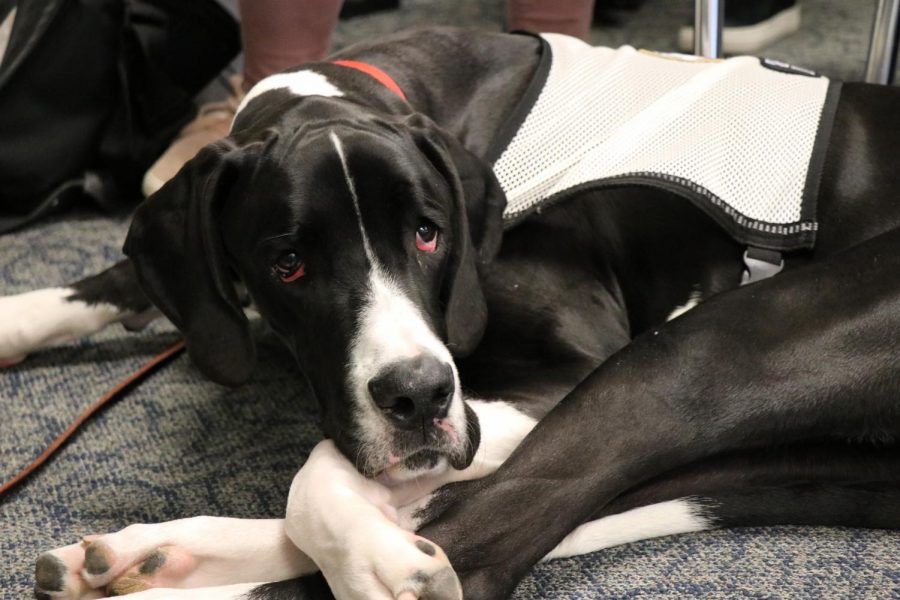The Wolfpack’s Latest Pup: Service Dog, Chief
Jan 17, 2018
Meet Chief, a 9-month-old Great Dane and the first service animal to walk the halls of Niles West. He is here to assist Molly Schoenbeck, a senior with diagnosed post-traumatic stress disorder (PTSD) and anxiety.
“First period he saw a spider, and he ate it,” Schoenbeck said. “But, besides that, he’s just sleepy. He’s a big dog, but he doesn’t make any noise.”
Schoenbeck, who created a GoFund Me last year to raise funds for Chief, credits much of her support to her friends and her family, but is extremely grateful to the strangers who donated to her cause. She adds that many of the donation notifications she received were from friends she hadn’t talked to in years, elementary school classmates, and even from names she had never seen before. When asked to describe the feeling behind the support, she was at a loss for words.
“The support, especially in my particular situation, has been incredible. I don’t even know how I could begin to explain it,” Schoenbeck said. “A lot of times, I get overwhelmed because of the amount of people around me in public. He helps me deal with that feeling and whenever I get flashbacks or anxiety in general. He’s been a huge help.”
In October, Schoenbeck mentioned the idea to her school counselor, Andrew Johnson, and the process of gaining approvals–at district, building, and classroom levels–began. For the district to comply with the Americans with Disabilities Act, the Schoenbeck family was asked to prove Molly’s medical diagnosis of PTSD and Anxiety. Once the medical papers were reviewed by the school board, Molly was granted permission to have Chief as a legal accommodation. At the building level, special effort was made to make sure no one in her classes had allergies or a fear of dogs. Because of this, her entire schedule was changed.
The idea of using a service animal stemmed from Schoenbeck’s cousin. He has cerebral palsy and uses a service dog to navigate a college campus and college life. Molly’s family hoped a service animal would reduce her anxiety stemming from a traditional school setting, and thus decrease her absences, which sometimes lasted weeks at a time. They began by contacting the organization VIP Service Dogs, better known as “Very Important Pooches.” After proving eligibility, Molly attended a training session to meet all of the available dogs.
“Chief came up to me before I could even come up to him. When I’m anxious, I start to shake my leg, and I think he noticed that. He instantly jumped up on my lap, and I knew I wanted him,” Schoenbeck said. “He chose me.”
Before VIP Service Dogs, Chief came from a Great Dane Breeder–one that specializes in training service dogs. The dogs are given up after two months, are transferred to professionals, and then train for five months. Molly attends classes in Naperville twice a week, aside from working with him for 1-2 hours every day. She describes the training process as one that is based on repetition.
“He first goes through basics: sit, stay, no voice (no barking). Once [we] bond, which we have, I start training him to do what I want him to do for me specifically. When I say ‘over,’ he comes and lays on top of me,” Schoenbeck said. “I speak certain words in Spanish because a lot of my family members don’t speak it. It keeps away questions from those who don’t understand.”
Besides schedule changes due to student allergies, Schoenbeck’s day has gone through other adjustments. Her 7:30 AM alarm has shifted to 6 AM. After feeding her bird and other dog, Dutchess (Chief’s best friend), she checks to make sure she has Chief’s leash, toys, towels for drooling, wipes for his paws, treats, and the most important item of the bundle–his vest.
“The vest is a signal for Chief. With it on, he knows he’s working. Students are not allowed to touch him unless vest is OFF. I take the vest off once I come home, and let’s just say, he’s…really bad,” Schoenbeck jokingly remarked. “With the vest on, he knows his expectations and what he needs to do, but he knows that home is where he can be a regular dog. He takes stuff off the counters, he barks a lot, and plays rough with Dutchess, just like any other dog would.”
Assistant Principal of Student Services Dr. Antwan Babakhani has played a vital role in serving as a liaison between the district office and Niles West. He believes the response to Chief has been overwhelmingly positive.
“A service animal is one’s right; the implementation of safeguards and communication was the hard part. Sometimes, there were unforeseen circumstances that emerged, so we had to build in the protocols to adjust when errors occurred,” Babakhani said. “The Niles West community was really behind the idea that we’re supporting our student’s needs. The prospect of a Great Dane coming to our school was exciting–Chief had a lot of fans before he even arrived at Niles West.”
A majority of the process, though, was handled by a Student Services team comprised of Assistant Director of Student Services Jacquelyn Smith, school psychologist Jennifer Hahne, and Andrew Johnson. The trio (or, according to Molly, the “Holy Trinity”) was responsible for meeting with her family, looking at schedules, and problem-solving.
“The protection of Molly’s rights as a student [is] a priority, but the assurance of other students’ protections, ones who may have allergies or fears of Chief, are also a priority. It took a lot of coordinating and organizing,” Smith said. “Given what [Molly] has gone through, she is doing a really great job. It is important for students to be respectful of both Molly and Chief and the work that he has to do.”
Similar to Smith, school counselor Andrew Johnson has been in a supportive role throughout the process. He describes Molly as a well-respected, optimistic student.
“I’m glad she has Chief here. The overall adjustment has gone very well,” Johnson said. “It’s been very educational for students. There have been a lot of great questions–everyone is very interested.”
As for Molly, the hardest part of the process was adjusting to people’s reactions. Though she describes 90% of the reactions as positive and uplifting, there have been instances where students have failed to respect both Chief and Molly.
“There’s a few people who will bark at him to get him to bark, or even start barking at me. The other day, someone in the hall smacked him. I’ve gotten questions about the reasoning behind having Chief and have gotten rude responses, some even saying I don’t have valid reasoning,” Schoenbeck said. “Chief is very good at ignoring these situations. He’s not scary–people shouldn’t be afraid of him.”
Though it may be hard to think of Chief as a worker, he is a trained professional. When he has his vest on, Chief’s job is to service Molly’s needs. Students and staff should make sure not to pet him while his vest is on. Many students at West have accommodations that help them maximize their learning opportunities. Molly’s just has a friendly face and occasionally eats spiders.
CORRECTION: A previous version of this article incorrectly indicated that Schoenbeck’s 504 plan was modified.





Cindy vamvakos • Jan 19, 2018 at 10:59 AM
How do I get a copy of this article?